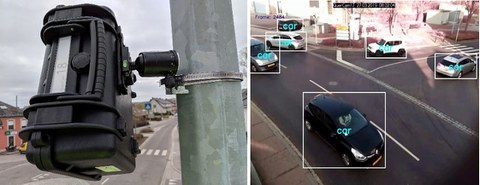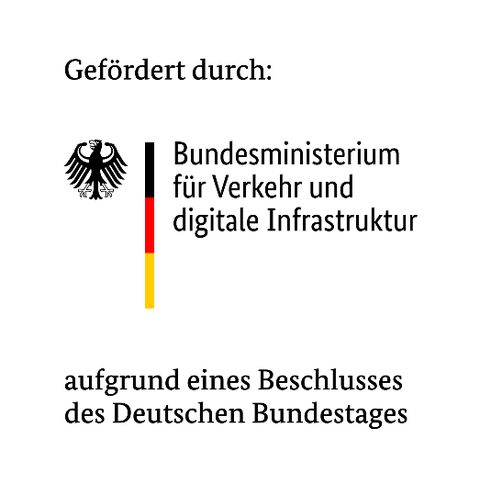Sep 24, 2020
TUD and a start-up want to facilitate AI-based traffic flow monitoring
Fewer accidents, less congestion, a better utilisation of existing infrastructure. A sound and comprehensive database could contribute to making road transport safer and more environmentally friendly. Presently, the necessary traffic flow data can often only be collected manually and to a limited extent - at great expense. The cause: automated solutions are either prohibitively expensive or can only be used by individuals with coding skills. This is where the open source project OpenTrafficCam, which has been running since 1st June 2020, comes into play.
The project is funded by the Federal Ministry of Transport and Digital Infrastructure as part of the Modernity Fund ("mFUND") funding guideline with a total funding volume of 98,000 EUR. OpenTrafficCam is operated by the start-up QuerPlaner from Karlsruhe in cooperation with the Chair of Integrated Transport Planning and Traffic Engineering at TU Dresden’s "Friedrich List" Faculty of Transport and Traffic Sciences.
The aim is to design a prototype for a mobile and cost-effective camera system that can be installed for a limited time, e.g. on lamp posts. At the same time, software for automated video recording of individual traffic movements is being developed, which will be used to derive traffic parameters such as number of vehicles and speeds. To ensure that the survey can be conducted safely and in compliance with personal data protection rights, there are also tips for the on-site survey as well as information on data protection. The camera system records video in a blurred and low resolution so that no personal characteristics are recorded, yet both human observers and the AI recognise that it is a car or a person walking.
The main advantage of the open source project is that it is developed "by transport experts for transport experts". The software will enable many standard traffic analyses in the future. Although current knowledge in the field of artificial intelligence is "under the bonnet", it should also be operable without programming knowledge.
Users will be provided with a complete system - from camera video recording to the recognition of road users and the analysis of traffic data. The project partners rely on existing and open source systems such as the Raspberry Pi as camera system, the YOLOv3 (Redmon & Farhadi) and IOU-Tracker (Bochinski et al.) algorithms for object detection and tracking as well as the OpenCV computer vision package. The workflow for the system application will be developed in workshops with experts from the fields of transportation, data protection and computer vision. This should result in an integrated system that meets the demands of future users and at the same time integrates modern algorithms. It ought to be designed in such a way so that continuous development remains possible even after the expiration of project funding.
Additional information is available at opentrafficcam.org. In the spirit of the open source idea, the progress of the project is documented freely accessible at github.com/OpenTrafficCam. Therefore, already in the development phase, an active participation is possible.
About the BMVI's mFUND: As part of the mFUND research initiative, the BMVI has been funding research and development projects relating to data-based digital applications for mobility 4.0 since 2016. In addition to financial support, mFUND supports networking between stakeholders from politics, business and research with various event formats, as well as access to the mCLOUD data portal.
Media enquiries:
Sebastian Buck
QuerPlaner
Tel.: +49 176 666 91 853
Martin Bärwolff
Professur für Integrierte Verkehrsplanung und Straßenverkehrstechnik
Tel.: +49 351 463-36661



